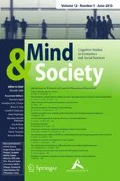Abstract
The goal of this research is to understand the interaction of implicit and explicit psychological processes in dealing with emotional distractions and meta-cognitive control of such distractions. The questions are how emotional and meta-cognitive processes can be separated into implicit and explicit components, and how such a separation can be utilized to improve self-regulation of emotion, which can have significant theoretical and practical implications.

Similar content being viewed by others
References
Arnold M, Gasson S (1954) Feelings and emotions as dynamic factors in personality integration. In: Arnold M, Gasson S (eds) The human person. Ronald, New York, pp 294–313
Damasio A (2005) Descartes’ error: emotion, reason, and the human brain. Penguin edition, London
Dyer M (1987) Emotion and their computations. Cogn Emot 1(3):323–347
Flavell J (1976) Metacognitive aspects of problem solving. In: Resnick B (ed) The nature of intelligence. Erlbaum, Hillsdale
Frijda N (1986) The emotion. Cambridge University Press, New York
Glenberg A, Wilkinson A, Epstein W (1982) The illusion of knowing: failure in the self assessment of comprehension. Mem Cogn 10:597–602
Gratch J, Marsella S (2004) A domain-independent framework for modeling emotion. Cogn Syst Res 5(4):269–306
Hirschfield L, Gelman S (eds) (1994) Mapping the mind: domain Specificity in cognition and culture. Cambridge University Press, New York
Hudlicka E, Fellous J (1996) Reviews of computational models of emotion. Manuscript
Kanfer R, Ackerman P (1989) Motivation and cognitive abilities. J Appl Psychol 74(4):657–690
Karmiloff-Smith A (1986) From meta-processes to conscious access: evidence from children’s metalinguistic and repair data. Cognition 23:95–147
Lambie J, Marcel A (2002) Consciousness and the variety of emotion experience: a theoretical framework. Psychol Rev 109(2):219–259
Lazarus R (1991) Emotion and adaptation. Oxford University Press, New York
Ledoux J (1992) Brain mechanisms of emotion and emotional learning. Curr Opin Neurobiol 2(2):191–197
Leven S, Levine D (1996) Multiattribute decision making in context: a dynamic neural network methodology. Cogn Sci 20:271–299
Lewis M (2004) Bridging emotion theory and neurobiology through dynamic systems modeling. Behav Brain Sci
Mathews R, Buss R, Stanley W, Blanchard-Fields F, Cho J, Druhan B (1989) Role of implicit and explicit processes in learning from examples: a synergistic effect. J Exp Psychol Learn Mem Cogn 15:1083–1100
Metcalfe J, Shimamura A (eds) (1994) Metacognition: knowing about knowing. MIT Press, Cambridge
O’Rorke P, Ortony A (1994) Explaining emotions. Cogn Sci 18:283–323
Ortony A, Clore G, Collins A (1988) The cognitive structures of emotions. Cambridge University Press, New York
Reber A (1989) Implicit learning and tacit knowledge. J Exp Psychol Gen 118(3):219–235
Reder L (ed) (1996) Implicit memory and metacognition. Erlbaum, Mahwah
Rumelhart D, McClelland J, The PDP Research Group (1986) Parallel distributed processing: explorations in the microstructures of cognition. MIT Press, Cambridge
Schacter D (1990) Toward a cognitive neuropsychology of awareness: implicit knowledge and anosagnosia. J Clin Exp Neuropsychol 12(1):155–178
Sherer K (1993) Studying the emotion-antecedent appraisal process: the expert system approach. Cogn Emot 7:325–355
Sloman A (1987) Motive mechanisms and emotions. Cogn Emot 1(3):217–234
Sun R (1994) Integrating rules and connectionism for robust commonsense reasoning. Wiley, New York
Sun R (1995) Robust reasoning: integrating rule-based and similarity-based reasoning. Artif Intell 75(2):241–296
Sun R (2002) Duality of the mind. Lawrence Erlbaum Associates, Mahwah
Sun R (2009) Motivational representations within a computational cognitive architecture. Cognitive Computation 1(1):91–103
Sun R, Helie S (2012) Psychologically realistic cognitive agents: taking human cognition seriously. J Exp Theor Artif Intell (in press)
Sun R, Mathews R (2003) Explicit and implicit processes of metacognition. In: Shohov S (ed) Advances in psychology research, vol 22. Nova Science Publishers, Hauppauge, pp 3–18
Sun R, Merrill E, Peterson T (2001) From implicit skills to explicit knowledge: a bottom-up model of skill learning. Cogn Sci 25(2):203–244
Sun R, Slusarz P, Terry C (2005) The interaction of the explicit and the implicit in skill learning: a dual-process approach. Psychol Rev
Sun R, Zhang X, Mathews R (2006) Modeling meta-cognition in a cognitive architecture. Cognitive Systems Res 7(4):327–338
Wilson N, Sun R, Mathews R (2009) A motivationally-based simulation of performance degradation under pressure. Neural Netw 22:502–508
Acknowledgments
We thank Sean Lane for his collaboration on work related to this project. We thank also our students for their involvement with various experimental aspects of this work. This work has been supported in part by the ARI grant W74V8H-05-K-0002 and the ONR grant N00014-08-1-0068.
Author information
Authors and Affiliations
Corresponding author
Rights and permissions
About this article
Cite this article
Sun, R., Mathews, R.C. Implicit cognition, emotion, and meta-cognitive control. Mind Soc 11, 107–119 (2012). https://doi.org/10.1007/s11299-012-0101-5
Received:
Accepted:
Published:
Issue Date:
DOI: https://doi.org/10.1007/s11299-012-0101-5




